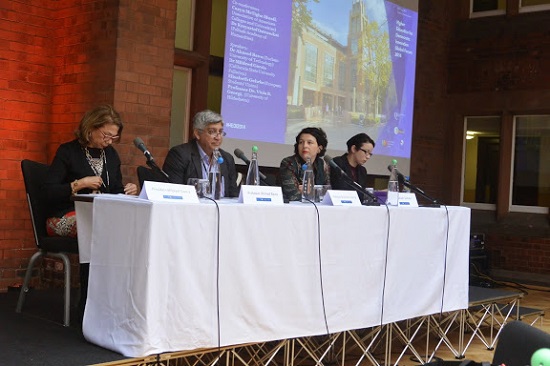
New technologies in international education
BELFAST – Mixed learning and teaching methods, student-centred learning and inclusive education are important methods in order to overcome many challenges that the education system faces, such as in incorporating new technologies.
Representatives of the European Students’ Union (ESU) presented how a strategic use of technology in classrooms could be used to enhance and improve the learning experience at the Higher Education for Democratic Innovation Forum from 25 to 27 June. The Queen’s University in Belfast, Northern Ireland, hosted the event.
This conference was co-organised by the Council of Europe, the U.S. Steering Committee of the International Consortium for Higher Education, Civic Responsibility and Democracy, Queen’s University Belfast, the European Wergeland Centre and ESU. It underlined the commitment of those organisations to democracy, human rights and the rule of law, as well as social cohesion and fostering an intercultural dialogue. Democratic innovation is also one of the Council of Europe’s leading themes in its recently adopted programme from 2014 to 2015.
The discussions focused on the role of higher education in promoting and developing democratic values, as well as the typical view of higher education in promoting the idea of a knowledge society. The responsibility of universities to local communities and to ensure a wide public access to knowledge and resources was also discussed. Ownership in higher education was also a topic put up for discussion, looking at different methods in which all voices, perspectives and challenges could be incorporated into decision-making structures at universities.
New technologies can bring many positive aspects to higher education, such as offering students an alternative option to more traditional forms of learning. However, this development still faces several challenges, such as the danger of lower completion rates, partly due to a lack of guidance and support, standardised teaching methods and systematic inequalities between traditional and online degrees.
Student-centred learning and inclusive education are therefore essential components in this development, by providing proper guidance and support, including students in governance and decision-making structures and making students full partners of the academic community and co-producers of knowledge. Teachers should act as facilitators in the learning process rather than merely as transmitters of knowledge. Active student engagement must be encouraged and supported to develop ways of critical thinking.
Elisabeth Gehrke, Vice-Chairperson of ESU, and Erin Nordal, a member of the Executive Committee, participated in panel discussions at the event on behalf of ESU. Gehrke presented different policies for inclusion in a panel discussion on democratic innovation and inclusion. Nordal spoke about the possibilities of new technologies in a session on implications to the democratic mission of higher education.
More information about the event can be accessed on the event’s website including a video recording of Gehrke’s and Nordal’s presentations.
— END —
For more information, please contact:
Elisabeth Gehrke, ESU Chairperson: +32/479.591.499 // elisabeth@esu-online.org or Robert Hlynur Baldursson, ESU Communications Manager: +32/473.669.894 // robert@esu-online.org

The European Students’ Union, headquartered in Brussels, is the umbrella organisation of 47 national unions of students from 39 European countries. ESU represents and promotes the educational, social, economical and cultural interests of students at the European level. Through its member unions, ESU represents over 11 million students in Europe. To find out more about ESU, follow us on Twitter @ESUtwt, check out or Facebook page or visit www.esu-online.org. ESU celebrates its 30th anniversary in 2012.
